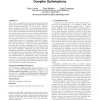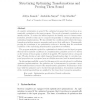101 search results - page 1 / 21 » Proving correctness of compiler optimizations by temporal lo... |
POPL
2002
ACM
14 years 4 months ago
2002
ACM
Many classical compiler optimizations can be elegantly expressed using rewrite rules of form: I = I if , where I, I are intermediate language instructions and is a property expre...
PLDI
2003
ACM
13 years 9 months ago
2003
ACM
We describe a technique for automatically proving compiler optimizations sound, meaning that their transformations are always semantics-preserving. We first present a domainspeci...
ENTCS
2007
13 years 4 months ago
2007
A compiler optimization is sound if the optimized program that it produces is semantically equivalent to the input program. The proofs of semantic equivalence are usually tedious....
POPL
2006
ACM
14 years 4 months ago
2006
ACM
This paper reports on the development and formal certification (proof of semantic preservation) of a compiler from Cminor (a Clike imperative language) to PowerPC assembly code, u...
PLDI
2009
ACM
13 years 11 months ago
2009
ACM
Translation validation is a technique for checking that, after an optimization has run, the input and output of the optimization are equivalent. Traditionally, translation validat...


